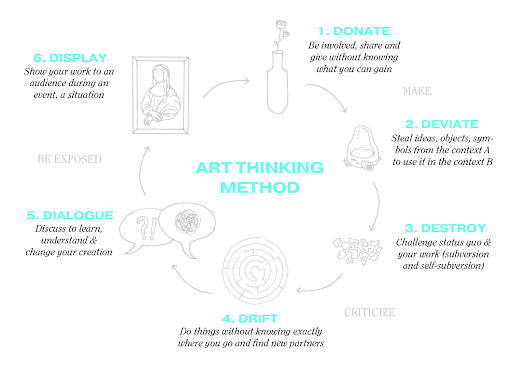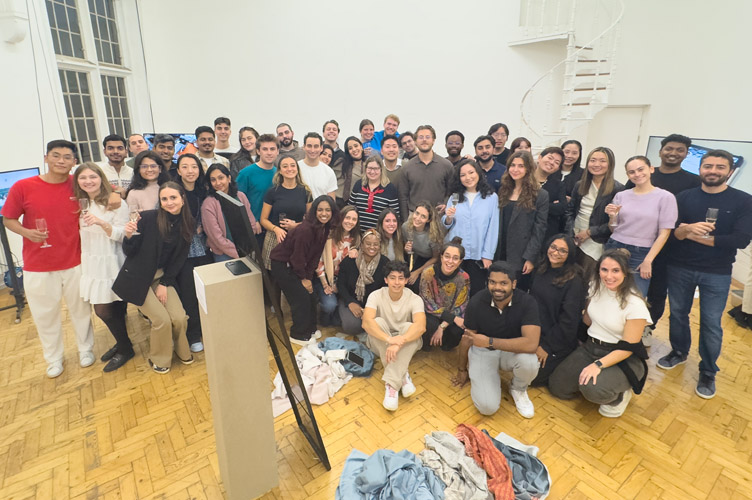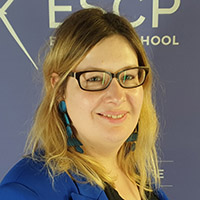The Art Thinking Method inspired MDT students to create ten thought-provoking installations and performances.
Each encouraged viewers to rethink their beliefs, from personal identity questions to broader societal critiques, inviting the audience to self-reflect.
As the world transforms with extraordinary speed, it is no longer enough for organisations to rely on gradual optimisation of their products and services. To truly succeed in the long term, tomorrow's leaders must look beyond conventional thinking. They should embrace unpredictability and dare to create the improbable in a world where emerging technologies, societal shifts, and environmental concerns are constantly changing the playing field.
With this in mind, ESCP Business School London Campus hosted its first Improbable Seminar for the MSc in Digital Transformation Management & Leadership (MDT) students. Culminating in an exhibition at the Camden Art Centre, students spent three days stepping out of their comfort zones to address issues they feel passionate about. This resulted in deeply reflective and provocative art pieces that resonate far beyond the classroom.

A New Way of Creation: Art Thinking's Six-Step Approach
Art Thinking is a method developed by ESCP Business School's Professor of Entrepreneurship, Sylvain Bureau that goes beyond the traditional educational frameworks. It fosters creativity through six radical practices—donate, deviate, destroy, drift, dialogue, and display— empowering students to challenge norms, collaborate, and generate innovative ideas.
Unlike traditional methods, Art Thinking doesn't focus on perfecting what we already know. Instead, it emphasises generating the unknown.
Starting with donate—a step of giving without expectation—participants must break free from transactional thinking. From there, their journey goes through phases of challenging and remaking ideas, closely guided by spontaneity, criticism and openness. By the final step, display, students have created works that encourage critical thinking, question societal norms, and push audiences to see beyond their usual views.
When was the last time you did something for the first time? The Art Thinking Collective offers participants of the Improbable Workshop the chance to be artists for the first time, often leading to their first exhibition. By embracing this unfamiliar experience, students connect deeply with their beliefs, society, the planet, and their own vulnerability. As a psychology researcher fascinated by human emotions and their impact on decisions and behaviours, it was a privilege to witness students navigate an emotional journey—from frustration to sadness to gratitude—supporting each other along the way. Unlike typical business school training, this workshop allows students to explore the unknown, creating exhibitions as unique as the participants themselves.
 Stela Ivanova
Stela IvanovaAssistant Professor of Entrepreneurship at ESCP Business School London Campus and Art Thinking workshop facilitator

Works that Challenge, Question, and Engage
The Art Thinking Method inspired MDT students to create ten thought-provoking installations and performances. Each encouraged viewers to rethink their beliefs, from personal identity questions to broader societal critiques, inviting the audience to self-reflect:
- Moulding – This art performance used layered fabric to explore how societal expectations can change our personal identity. It probed viewers to question whether we shape our own lives or conform to external pressures.
- Behind the Smile – This series of portraits invited viewers to look beyond polished exteriors and confront hidden vulnerabilities that each of us hold. It emphasised that fostering real connections with each other comes through sharing struggles.
- Reality Check – An installation exposed the illusion of social media connections. Layered photography showed how our online personas mask loneliness, prompting viewers to consider if we are trading genuine relationships for virtual approval.
- Digital Scars – An interactive installation highlighted the hidden environmental costs of AI. Attendees could interact with a "sustainability assistant", with each prompt visibly damaging a nearby plant. This showed nature's sacrifice for our virtual interactions and digital convenience.
- Disconnected – This installation revealed the impact of 5G towers on bird migration, symbolising humanity's trade-off between technological advancement and ecological balance.
- Too Much on Your Plate – Through a "menu" of disposable fashion, this piece criticised fast fashion, constant buying and the short-lived happiness we achieve from consumption of material goods.
- The Golden Recipe – This piece used iconic fast food brands to replicate the Grammy Awards. It offered critique of the industrialisation of fame and music, questioning the true artistry behind popular success.
- Religious Election – An interactive voting experience that explored political manipulation. The audience had the chance to vote based on religious quotes from leaders, only to later discover contradictions. This demonstrated the hypocrisy of political figures and how they influence public opinions.
- Silent Hunt in the Jungle – An audio-visual representation of objectification, showing how everyday environments can turn predatory, provoking reflection on power dynamics, gender relations and how we look at others.
- A Child's Truth – A video that explored the gap between childhood dreams and adult careers. The team also offered an interactive opportunity to write down your childhood dreams and share them with the audience, contributing to the discussion as to whether we stayed true to our early hopes.
This immersive experience invited students to observe and question the status quo, and offered innovative ways for them to break down issues and work with their team members to build something new. Each project turned theoretical ideas into real, thought-provoking art, showing how creativity can reveal hidden parts of society and inspire new ways of thinking.
We are incredibly proud of our MSc in Digital Transformation Management & Leadership students who challenged themselves in embracing emotional vulnerability. This is not a task often asked of students in business schools; yet if we want our students to be ready to tackle the urgent global challenges which they will be faced with upon graduation, it is important that they can embrace the unknown and build their communication skills. In providing new perspectives and challenging the status-quo, the art pieces created demonstrated real originality and, most significantly, the power of creativity to question ourselves, open up debates and encourage dialogue for real transformation.
 Chloe Preece
Chloe PreeceAssociate Professor of Marketing at ESCP London Campus and Art Thinking workshop facilitator
Inspiring the "Impossible" Ideas Movement
The Art Thinking seminar at ESCP, launched initially with an artist, Pierre Tectin, and more recently supported by the ESCP Improbable Chair by Galeries Lafayette, demonstrates how creativity can be harnessed to address real-world issues and develop an adaptable mindset to tackle challenges in an ever-changing world. It invites everyone to not only seek solutions to problems but to actively define them by questioning societal structures and imagining alternatives that could reshape the future.
The seminar boosts essential skills for the future of work, including analytical thinking and innovation, creative thinking, emotional intelligence, and leadership and social influence. These skills align with the mission of the MSc in Digital Transformation Management & Leadership programme to prepare students to effectively tackle tomorrow’s business landscape and lead it with authenticity, purpose, and bold vision.
Over three intense days, our team of five created a deeply personal art piece, weaving together our different hearts and minds. I never imagined this would be possible, let alone that we'd showcase it at an Art Exhibition in such a short amount of time. I am definitely coming out of this experience feeling a part of me healed and with new lifelong friends.
 Woojae Dong
Woojae DongMSc in Digital Transformation Management & Leadership student
Through initiatives like the Improbable Seminar, ESCP is redefining the role of business education, preparing the next generation of leaders who can experiment boldly and inspire the improbable and the extraordinary.
Now it is time to ask yourself: what might you achieve if you embraced the improbable?
Discover more about the Art Thinking Method and the MSc in Digital Transformation Management & Leadership.
Campuses